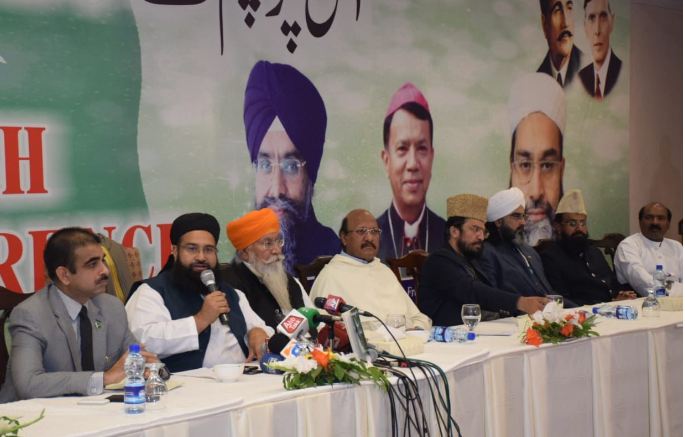Pakistan champions peaceful diplomacy, embracing Islamic principles of love, tolerance in relations with neighbors: Speakers
Pakistan advocates for peace with its neighboring countries, guided by the principles of Islam that promote peace, love, and tolerance.
Distinguished speakers emphasized these values at the Interfaith Harmony Conference on Sunday.
Lahore: The conference, led by Hafiz Muhammad Tahir Mahmood Ashrafi, President of the International Interfaith Harmony Council, Chairman of Pakistan Ulema Council, and Prime Minister’s Special Representative on Religious Harmony, saw contributions from leaders such as Sardar Ranjit Singh, Father James Chinon, Syed Ziaullah Shah Bukhari, Sohail Ahmed Raza, Pastor Emmanuel Khokhar, Pandit Kashi Ram, Rana Shahid, Maulana Aslam Siddiqui, Syed Ali Raza, and others.
The conference further welcomed diplomatic representatives from the United States, Turkey, and various other countries, fostering international collaboration and understanding.
The religious scholars and leaders said the pursuit of peace is not a sign of weakness. Both the government and the people of Pakistan deeply respect the sanctity of all religions, extending a warm welcome to Sikhs, Hindus, Buddhists, and followers of other faiths.
They said the ongoing events in Palestine are a tragic assault on humanity, constituting a genocide against the Palestinian people. All religious communities join in unequivocal condemnation of the egregious cruelty and brutality unfolding in Palestine. “We earnestly implore for an immediate and imperative ceasefire in the region,” they added.
The conference’s collective statement underscored that Islam rejects any notion of coercion or conversion. Engaging in such acts is not only contrary to Islamic teachings but also violates the laws of Pakistan, warranting legal action against the perpetrator.
In the present context, they said fostering dialogue among followers of diverse religions is essential. Pakistan warmly embraces Sikh pilgrims during the commemoration of Baba Guru Nanak’s birth anniversary. Let us designate 2024 as a year dedicated to peace, love, tolerance, and interfaith harmony, promoting unity and understanding among all.
Ashrafi emphasized that Sikh pilgrims are encouraged to visit Pakistan and experience the love extended to them in this country.
Regarding the challenges faced by the Christian community in Jaranwala, collective efforts were made to seek forgiveness, he said adding that traveling to Pakistan should pose no concerns; the government has actively facilitated the establishment of temples and churches across the country. He reiterated that Pakistan is inclusive for people of all religions and welcomes visits at any time.
Ashrafi expressed the state’s commitment to ensuring maximum convenience for both Muslims and non-Muslims, suggesting the use of “Muslims and non-Muslims” instead of the term “minority.”
He affirmed that the Constitution of Pakistan safeguards the rights of all citizens, irrespective of their religious affiliations. Leaders of various faiths share equal rights granted by the constitution, he added.
Emphasizing Pakistan’s commitment to peace, he highlighted that advocating for peace is a strong stance, not a sign of weakness.
Expressing collective sorrow for the tragic events in Palestine, where 20,000 individuals, including 70 percent of children, have lost their lives, Ashrafi underscored that war and terrorism find no endorsement in any religion.
He said the state of Pakistan prioritizes peace for regional stability, advocating for diplomatic resolutions to address the challenges in Kashmir and Palestine.
Expressing a desire to live harmoniously with neighboring nations, Ashrafi noted the Kartarpur border’s opening as a gesture toward peace. Furthermore, he clarified that Islam does not support forced marriage or conversion, emphasizing the principles of choice and tolerance within the faith.

















